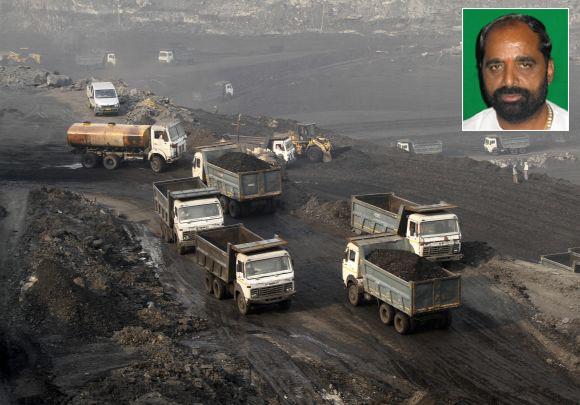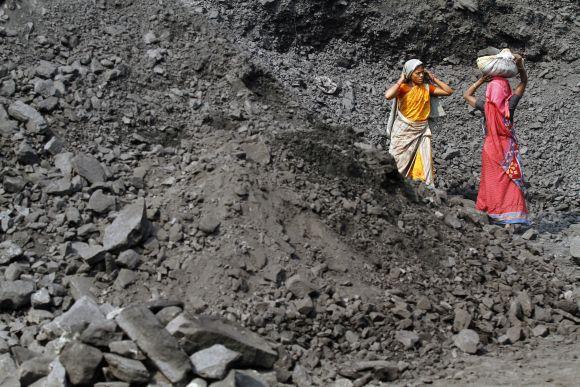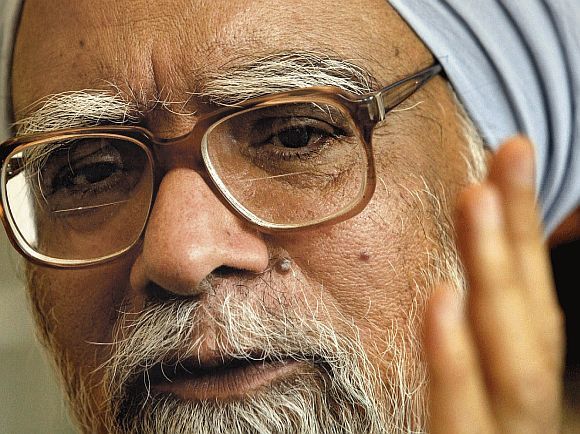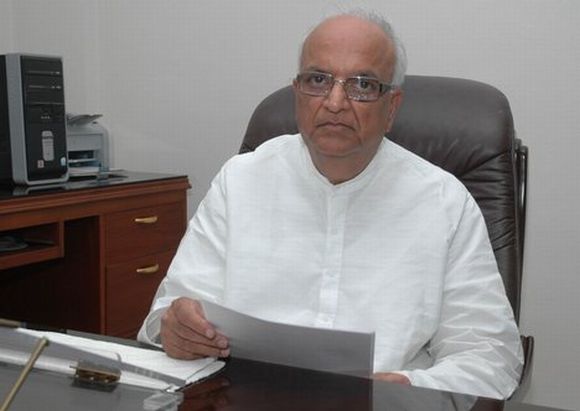
Hansraj Ahir, the man who wrote more than 15 letters to Prime Minister Manmohan Singh, one of the most learned Indians, to alert him about the glaring irregularities in allotment of coal blocks, is an undergraduate.
The self-confessed (Veer) Savarkarite, Ahir isn't well-versed in English. He is the letter-master and somehow manages to send letters in Hindi, English and even Marathi, his native language on the issues as complex as the national policy of allotment of coal.
The central theme of his letters on coal allotment was that coal should not be excavated in haste without realising its real value. Coal, the most important energy source in India's energy sector, meets around 52 percent of primary commercial energy needs as around 66 percent of India's power generation is coal based.
India is the 3rd largest coal producing country in the world after China and the United States. One of the letters to the Central Vigilance Commissioner had been forwarded to the Central Bureau of Investigation and has become the basis of the investigation of the alleged coal scam. The CBI investigation is in full swing which has led to raids at many places on Tuesday.
Ahir, a three time BJP MP from Chandrapur in Maharashtra, also wrote to the Comptroller and Auditor General about "free of charge" allocation of 221 coal blocks to 150 companies by the United Progressive Alliance government. He questioned Dr Singh many times -- Why give away at no cost 21.69 billion tonnes of coal reserves to private parties?
According to him, former prime minister P V Narismha Rao should be blamed for forming and implementing the policy that allowed free allocation of coal. The same policy was continued by the Atal Bihari Vajpayee government but the price of coal was low at that time due to the lack of demand.
During the UPA-1 regime under Dr Singh's watch the government gave away valuable coal for free to the alleged end-users when its market price was rising in domestic and international markets.
Meanwhile, the Singh government did attempt to amend the law and fine-tune the coal allocation policy but only after giving away almost one-seventh of the country's coal reserves for free. It took more than five years to make competitive bidding of coal into a mandatory policy.
The allegation is that the delay helped Dasari Narayana Rao and Santosh Bagrodia, ministers of state for coal, to dole out favours. They ran the ministry as if there will be no tomorrow, Ahir says and adds: "I would say Bagrodia played a huge role in the coal allocation. He knew the real importance of koela (coal)."
Dasari and Bagrodia knew the importance of political patronage to get anything out of the system. Also, they knew coal blocks would move and shake the power sector. The real trigger of 'free allotment' of coal blocks came due to economic reforms in the power sector which created dramatic demand for coal and increased its price manifold, making the Bagrodias of the political world very important in the scheme of things of the business planning of groups like Tatas, Ambani, Adani, Jindal and Mittal.
Ahir, who is fighting a battle to ensure that precious mineral coal doesn't go away cheap, says, "The government did not verify the credentials of applicants and gave away coal blocks to many benami companies."
In an exclusive interview with rediff.com's Sheela Bhatt, Ahir explains, quite convincingly, his view point.
Please click NEXT to read the full interview..

What inspired you to take up the issue of the coal allotment policy?
My constituency is Chandrapur in Maharashtra. In and around my area, 3 percent of India's coal deposits are located. I got interested in it because in my area the issue of land acquisition for the mining of coal is bothering people.
Second, the pollution due to mining also concerns our people. Three, coal production gives employment. So I have known all issues related to coal mining.
I have got big success in the land acquisition issue. I opted to join the standing committee on coal in Parliament. In 2006, I came to know that we are giving coal blocks to the private sector. Much later I came to know that it will be given free of cost to the corporations. The issue puzzled me. I kept asking why free of cost?
I am a fan of Coal India Limited. It was founded in 1975 by Indira Gandhi. She nationalised the coal sector in 1972. Everyone welcomed it because it was a good decision. It's a successful and a Navratna company. It had coal production of 100 million tonnes in 1980-81. Now it has turnover of over 450 million tonnes.
In 2011, Coal India was termed as the most valued company in the country in terms of market capitalisation. The company's value is Rs 251,296 crore. In view of my understanding of Coal India's working, I opposed the private sector's entry at such careless terms.
I kept writing letters, kept opposing it. I opposed the government's moves in the Standing Committee too. In fact, many MPs supported my stand in the committee.
We were able to see that as coal production in our country was rising, the employment generation was on rise too. Coal India's agenda was to make coal easily available and make it available at a reasonable price.
That was Indira Gandhi's dream. I think, in 2005, some officers of Coal India, some officers of the coal ministry and the power ministry provoked the government to go for free allocation. The ministers bought the idea.
From 2006 to 2010 I wrote some 15 times to Dr Singh. I wrote to the CVC and CAG too. I wrote to the Planning Commission and the finance minister too.
My prime contention was that let us not give coal for free. Second, I insisted that Coal India is a good company. Let us not allow it to deteriorate due to corporate India's interests. Third, I pointed out that those who are getting free coal blocks are dubious. Most of them, not all, don't have the 'end-user' plants.
They are not making cement, power or steel. Why is government not thinking twice before giving away coal blocks to them? I wrote letters pointing out that some allottees have sold the coal blocks. The ownership of rights of mining coal has changed hands in some cases. It's against the law. They changed the management of the company after obtaining the free coal blocks.
I was trying to stop private players in the sector who came in just to make big bucks.
I told my party leaders about the subject. After 2009, I informed Sushma Swaraj and Arun Jaitley. They advised me that I should follow it thoroughly. They said keep working through the Standing Committee. Keep getting information, keep complaining to the government. Whenever the opportunity will arrive the party would turn it into "an issue".
Sushmaji even arranged two national level press conferences of myself and (BJP spokesperson) Prakash Javdekar. We got little bit of coverage. The complaints against the coal allocation increased. The CAG made the draft report. Even, the CVC send my letter to the CBI and investigations began. The CAG's report proves that my complaint has an element of truth in it.
Whatever I have been writing since 2006 and whatever government documents on subject are available say that the country lost money. The coal allocation hurt the national interest.
Please ...

Which individuals should be blamed for the allotment of coal blocks to unfit 'end-users'?
The bureaucrats in the coal and power ministries, who were serving between 2005 to 2008, were playing games. Two Congress ministers of state, namely Rao and Bagrodia were fully involved in allocation of coal blocks when Dr Singh was heading the ministry.
I would say that Bagrodia has played a huge role in the coal allocation. He can be faulted for certain wrongdoings.
Why did Dr Singh, who is considered as Mr Clean, not get alerted when an MP like you was pointing out the grey areas of the policy?
I would say that the prime minister didn't understand 'coal'. He didn't take the issue of free allocation seriously. Far from the talk of him being Mr Clean, I would say right under his nose the loot took place and he looked the other way.
Who played the fixer and how?
When the UPA-I started allotting the blocks they were looking at the end-use of the coal. It was decided that the coal will be used for a specified purpose and won't be 'sold' for any other use. In the process, the government didn't give enough attention to the mining experience of the allottee. The companies came to coal ministry. They were showing everything just 'on paper'.
They told the government while applying for free coal blocks that "we have land here, we have the plant there, we have got the permission from the state government...from the ministry of environment... etc, etc."
They spoke some truth, some lies and managed to get the coal blocks. The way these applicants were treated by the coal ministry, and the way they got the coal was wrong. The officers of the coal ministry were hand-in-glove with the applicants.
Please ...

After the exit of Shibu Soren, the ministry was handled by the PM Singh, Rao, and later, Bagrodia came in as deputies. Out these two MoS, who was more active in the allotment of coal?
The fundamental fault was in the policy itself. I would say Bagrodia has played a huge role in the coal allocation. He knew the real importance of koela (coal). The coal is a national asset. It doesn't belong to the Congress party, minister or to anybody.
Why is it for free? They told me that the country needs coal. Whoever can mine it and produce energy or other important things they should get coal easily. The argument of the UPA was that mining of coal too requires investment. So, if coal is cheap or free then coal-based power will be cheaper.
I believe there is no high technology involved in it. Coal India can develop further and make it more efficient. Coal India has been asking for coal blocks from this government. Since 2008, they have applied for 100 plus coal blocks but this government has not given it any.
SAIL, NALCO, NTPC and the mining development outfits and many other government or semi-government companies are applying for it. They have not been getting free coal blocks.
What was the UPA government's vested interest in allotting coal only to private companies? What is the logic behind not giving coal mines to Coal India which is a Navrtatna company and which is engaged in generating employment?
Once Coal India had 8 lakh people working now it has only 3.65 lakh. This fall is due to the UPA government's policy and ill-treatment of Coal India.
There are so many discrepancies in implementation of coal policy that this government won't be able to answer.
There was one important condition before getting absolutely free coal. The applicant had to give the bank guarantee against royalty. The condition was that if the allottee didn't start coal production in 42 months then the allotment of free coal blocks would be cancelled, the company would be prosecuted and fifty percent of the bank guarantee would be encashed.
However, this government has failed to encash the bank guarantees from the 56 allottees who are not yet mining.
According to our estimate the coal ministry failed to collect bank guarantees amounting to Rs 247 crore from the failed ventures. Many defaulters, who are still holding coal blocks, haven't renewed the bank guarantee. This is the violation of norms. The norms say that 50 percent of bank guarantees should be against the start of production and the balance 50 percent with guaranteed production.
The government has cancelled 24 coal blocks including nine belonging to the private companies but not one company's bank guarantee has been enscashed. Why? The government is saving them, defending them! There were bogus companies working in the field and they are let off. This is a crime.
According to the CAG report, out of 149 companies, 114 companies are such whose time limit to open the coal blocks is over. They have not mined coal. Under the law, which is unambiguous, right now, today itself the coal ministry can cancel the blocks and encash bank guarantees. Why it is not done? Why are you defending the companies who are doing wrong?
(Coal minister) Sriprakash Jaiswal is misleading the country. The government says they would not cancel the coal allotment.
They argue if they cancel the coal allotment there will be loss of power production. This is a lie. They have not been mining coal so where is the question of electricity? Today, electricity is being produced from imported coal or the coal supplied by Coal India.
TOMORROW: THE MODUS OPERANDI OF THE COAL SCAM.
...